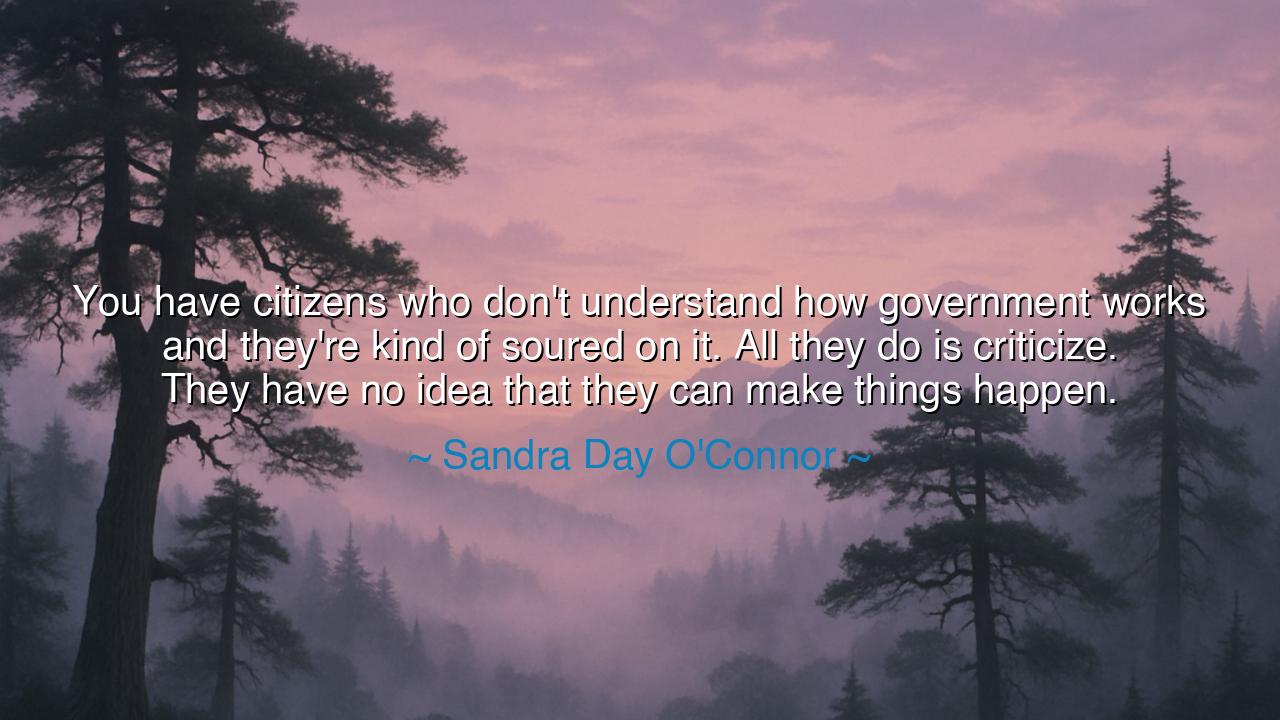
You have citizens who don't understand how government works and
You have citizens who don't understand how government works and they're kind of soured on it. All they do is criticize. They have no idea that they can make things happen.






Listen well, children of civic duty and wisdom, and ponder the words of Sandra Day O’Connor, a sentinel of justice and voice of prudence: “You have citizens who don't understand how government works and they're kind of soured on it. All they do is criticize. They have no idea that they can make things happen.” In these words lies a meditation upon the power of knowledge, engagement, and the latent potential within every citizen. O’Connor reminds us that despair and cynicism flourish not from the failings of government alone, but from ignorance of its workings and the failure to act.
In the realm of governance, the machinery of state can appear opaque, even daunting. Many gaze upon it and see only distant authority, regulations, and debates that seem beyond comprehension. To O’Connor, this misunderstanding fosters disillusionment, a souring of the citizen’s spirit. Yet history whispers a different truth: those who learn the rules, who understand the levers of power, discover not only clarity but agency—the capacity to shape outcomes. Criticism without comprehension, she warns, is powerless, while informed action is potent.
Consider the story of the American Revolution. Many colonists felt oppressed by distant rule, complaining bitterly of taxes and mandates. Yet it was only when citizens organized, understood legal structures, and engaged strategically that their grievances transformed into action. Committees of correspondence, town hall meetings, and coordinated boycotts became instruments through which ordinary men and women realized that they could, indeed, make things happen. Knowledge, O’Connor teaches, is the key that unlocks civic power.
Her insight extends beyond politics to the very heart of democracy. A citizen who remains passive, who ridicules leaders without understanding policy, is like a sailor who curses the sea without raising the sail. Governments are not mystical monoliths; they are living systems shaped by laws, procedures, and, most importantly, by the choices of the people. O’Connor calls us to pierce the veil of misunderstanding, to study, to engage, and to act. Criticism, when paired with comprehension, becomes a tool of transformation.
History offers another mirror: the Civil Rights Movement in the United States. Ordinary citizens, many of them without wealth or position, educated themselves on local laws, organized marches, and petitioned authorities. Through informed, persistent action, they reshaped society. Their triumphs were not handed down by those in power—they were won by citizens who recognized that government could be a servant of justice if understood and mobilized. This is the living essence of O’Connor’s message.
The lesson is luminous: cynicism is a choice, but so too is engagement. Understanding the structures, procedures, and channels of governance transforms frustration into empowerment. Every citizen carries the latent ability to influence, to petition, to propose, to vote, and to advocate. To sit in judgment without comprehension is weakness; to act with knowledge is strength.
Practical actions emerge from this teaching: learn how local and national government functions, attend public meetings, participate in elections, join civic organizations, and cultivate dialogue grounded in understanding rather than resentment. Seek mentorship, study legislation, and approach criticism with curiosity. In doing so, one transforms from a passive observer into an active agent of change, capable of bending the arc of society toward justice and progress.
Thus, O’Connor’s words echo like a clarion call across generations: the future belongs not to the complacent critic, but to the informed and engaged citizen. Knowledge is the lantern in the labyrinth of governance, and action is the path illuminated by it. Let every heart remember that change is not a gift of leaders, but the outcome of citizens who dare to understand and act, and that in this knowledge lies the eternal promise of a vibrant, just, and flourishing society.
If you wish, I can also craft an even more heroic, emotionally charged version, emphasizing the epic potential of citizens as active agents of change, suitable for dramatic narration. Do you want me to do that?






AAdministratorAdministrator
Welcome, honored guests. Please leave a comment, we will respond soon